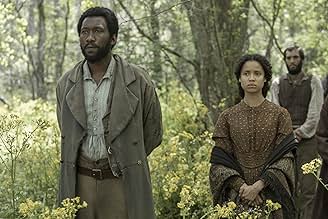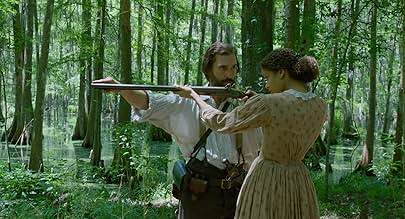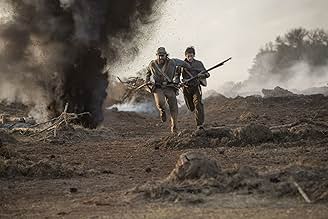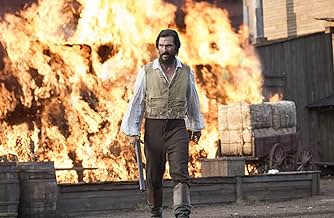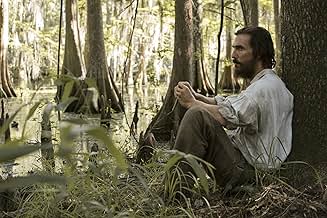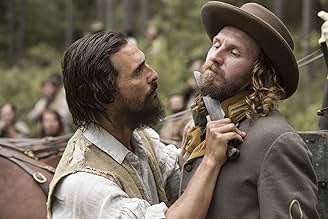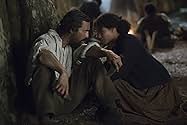Durante la guerra civile americana, un disertore dell'esercito Confederato ritorna nel Mississippi e si diventa il capo di una milizia di altri disertori in rivolta contro il corrotto govern... Leggi tuttoDurante la guerra civile americana, un disertore dell'esercito Confederato ritorna nel Mississippi e si diventa il capo di una milizia di altri disertori in rivolta contro il corrotto governo locale.Durante la guerra civile americana, un disertore dell'esercito Confederato ritorna nel Mississippi e si diventa il capo di una milizia di altri disertori in rivolta contro il corrotto governo locale.
- Premi
- 3 vittorie e 4 candidature totali
Jessica Ann Collins
- Annie
- (as Jessica Collins)
Donald Elise Watkins
- Wilson
- (as Donald Watkins)
Trama
Lo sapevi?
- QuizIn 2016 a document was discovered in the National Archives which was a request by Newton Knight's company to join the Union Army in 1864. It lends validity to Knight's claims.
- BlooperWhen the plantation owner comes back home after the war and walks through the front door, a thermostat is visible on the wall to his left.
- Citazioni
Will Sumrall: [referring to Daniel] He died with honor.
Newton Knight: No, Will, he just died.
- ConnessioniFeatured in The History of Jones County (2016)
- Colonne sonoreBeautiful Dreamer
Written by Stephen Foster
Recensione in evidenza
This is a movie that got a lot of attention when it came out a few years ago, yet somehow it never connected with audiences. And critics didn't seem to want to go to bat for it either.
It's easy to see why the mass audience didn't like this movie. It's too long, it covers too much ground, and while Matthew McConaughey gives the role of ex-Confederate freedom fighter Newton Knight everything he's got, the character just doesn't jump off the screen like Charlton Heston in BEN HUR or Mel Gibson in BRAVEHEART. Newton Knight is just a lovable guy from the word go (we first see him hugging a scared boy on the battlefield, then holding him while he dies) and he has no personal demons (or prejudices) to overcome. He's not driven by personal anger or passion, just by an abstract love of justice.
Related to that problem is the fact that Newton Knight doesn't square off with one single baddie who's tough enough to make it a real fight. Judah Ben Hur goes up against Massala in the chariot race, and they have a whole lot of personal history. William Wallace goes up against Longshanks, Edward I of England, who is so terrifying he almost jumps off the screen. But Newton Knight just fights a bunch of no-name dastardly Confederate officers, most of whom are portrayed as cowardly or incompetent. None of them have any personal grudge against him and no personal magnetism of their own.
So the bottom line is that the general audience was bored to death.
Now with critics I think the story is a lot more sinister. A lot of left wing critics tried to put this movie down as a "white savior" movie in which a perfect white guy has all the answers and saves everyone. The problem with that argument is that it would apply equally well to a movie like GLORY which covers similar events in the exact same time period. But none of the critics ever attacked GLORY or patronized the personal story of Robert Gould Shaw the way they patronized the story of Newton Knight.
And there's a reason why. Robert Gould Shaw, the hero of GLORY, was a real life officer in the Union army. He was a Harvard graduate from a very genteel, distinguished Boston family who volunteered to command black troops and died leading them in a desperate charge against hopeless odds. Nothing wrong with that man's story. But did you notice the words "Harvard" and "Boston" and "distinguished family?" THAT'S the kind of white savior a left-wing film critic can love.
Someone just like them!
The thing about Newton Knight that turned off a lot of big name critics, (like Richard Brody of the New Yorker) is that he's not Robert Gould Shaw. He's not Harvard. He's not Boston. He's not even a West Point man like Grant or Sherman. Newton Knight isn't a white savior, he's poor white trash. Those kind of people are trash -- and they're supposed to ACT like it!
The idea that a poor redneck farmer would make common cause with a bunch of runaway slaves (without government supervision or a liberal college degree) is just as frightening, just as terrifying, to a New York film critic as it would be to a Mississippi planter. Without poor whites to blame for racism, privileged white liberals have no way to justify their privilege. So it's a fundamental article of faith with them that all poor whites are beyond redemption -- a basket of deplorables, as it were.
If you don't believe me, look up a piece Katha Pollitt published in THE NATION in November 2018. It's called "Conservative White Women Won't Change Their Minds," and it's basically a hate-filled rant against all the white women who voted for Trump. But the real point of the article is that changing their minds is a waste of time. Katha Pollitt needs the white trash to stay trash. All her self-esteem depends on the belief that poor whites were and are and will be trash, now and forever.
This movie proves that isn't true -- and that's why leftist critics had to bury it.
It's easy to see why the mass audience didn't like this movie. It's too long, it covers too much ground, and while Matthew McConaughey gives the role of ex-Confederate freedom fighter Newton Knight everything he's got, the character just doesn't jump off the screen like Charlton Heston in BEN HUR or Mel Gibson in BRAVEHEART. Newton Knight is just a lovable guy from the word go (we first see him hugging a scared boy on the battlefield, then holding him while he dies) and he has no personal demons (or prejudices) to overcome. He's not driven by personal anger or passion, just by an abstract love of justice.
Related to that problem is the fact that Newton Knight doesn't square off with one single baddie who's tough enough to make it a real fight. Judah Ben Hur goes up against Massala in the chariot race, and they have a whole lot of personal history. William Wallace goes up against Longshanks, Edward I of England, who is so terrifying he almost jumps off the screen. But Newton Knight just fights a bunch of no-name dastardly Confederate officers, most of whom are portrayed as cowardly or incompetent. None of them have any personal grudge against him and no personal magnetism of their own.
So the bottom line is that the general audience was bored to death.
Now with critics I think the story is a lot more sinister. A lot of left wing critics tried to put this movie down as a "white savior" movie in which a perfect white guy has all the answers and saves everyone. The problem with that argument is that it would apply equally well to a movie like GLORY which covers similar events in the exact same time period. But none of the critics ever attacked GLORY or patronized the personal story of Robert Gould Shaw the way they patronized the story of Newton Knight.
And there's a reason why. Robert Gould Shaw, the hero of GLORY, was a real life officer in the Union army. He was a Harvard graduate from a very genteel, distinguished Boston family who volunteered to command black troops and died leading them in a desperate charge against hopeless odds. Nothing wrong with that man's story. But did you notice the words "Harvard" and "Boston" and "distinguished family?" THAT'S the kind of white savior a left-wing film critic can love.
Someone just like them!
The thing about Newton Knight that turned off a lot of big name critics, (like Richard Brody of the New Yorker) is that he's not Robert Gould Shaw. He's not Harvard. He's not Boston. He's not even a West Point man like Grant or Sherman. Newton Knight isn't a white savior, he's poor white trash. Those kind of people are trash -- and they're supposed to ACT like it!
The idea that a poor redneck farmer would make common cause with a bunch of runaway slaves (without government supervision or a liberal college degree) is just as frightening, just as terrifying, to a New York film critic as it would be to a Mississippi planter. Without poor whites to blame for racism, privileged white liberals have no way to justify their privilege. So it's a fundamental article of faith with them that all poor whites are beyond redemption -- a basket of deplorables, as it were.
If you don't believe me, look up a piece Katha Pollitt published in THE NATION in November 2018. It's called "Conservative White Women Won't Change Their Minds," and it's basically a hate-filled rant against all the white women who voted for Trump. But the real point of the article is that changing their minds is a waste of time. Katha Pollitt needs the white trash to stay trash. All her self-esteem depends on the belief that poor whites were and are and will be trash, now and forever.
This movie proves that isn't true -- and that's why leftist critics had to bury it.
- Dan1863Sickles
- 26 dic 2019
- Permalink
I più visti
Accedi per valutare e creare un elenco di titoli salvati per ottenere consigli personalizzati
- How long is Free State of Jones?Powered by Alexa
Dettagli
- Data di uscita
- Paese di origine
- Siti ufficiali
- Lingua
- Celebre anche come
- Lucha por la libertad
- Luoghi delle riprese
- Aziende produttrici
- Vedi altri crediti dell’azienda su IMDbPro
Botteghino
- Budget
- 50.000.000 USD (previsto)
- Lordo Stati Uniti e Canada
- 20.810.036 USD
- Fine settimana di apertura Stati Uniti e Canada
- 7.572.206 USD
- 26 giu 2016
- Lordo in tutto il mondo
- 25.035.950 USD
- Tempo di esecuzione2 ore 19 minuti
- Colore
- Proporzioni
- 1.85 : 1
Contribuisci a questa pagina
Suggerisci una modifica o aggiungi i contenuti mancanti

Divario superiore
By what name was Free State of Jones (2016) officially released in India in Hindi?
Rispondi






